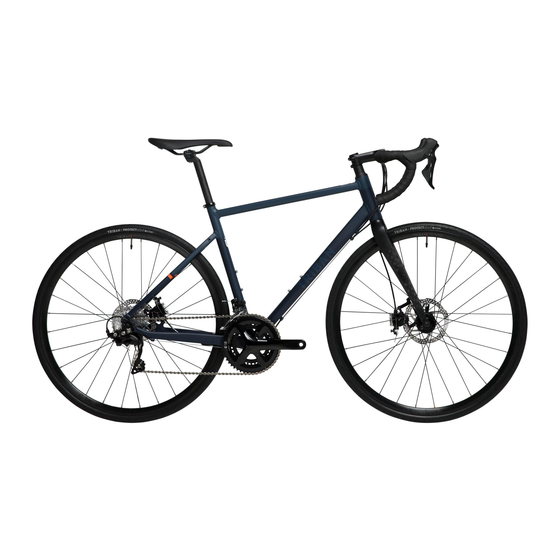Decathlon Elops 500 Instrukcja obsługi i instrukcje gwarancyjne - Strona 7
Przeglądaj online lub pobierz pdf Instrukcja obsługi i instrukcje gwarancyjne dla Rower Decathlon Elops 500. Decathlon Elops 500 17 stron.

Is it raining or wet?
In this case, be even more careful. The risks in braking increase and the adheren-
ce of your tyres on the road is reduced. Also remember that the visibility of motor
vehicles is reduced in bad weather.
Are your pedals properly tightened?
Check your pedal is properly tightened to the crank.. Read the section on how to
fix your pedals IV 2/ ...
How do clipless pedals function?
Engage and disengage your shoes in the pedals before leaving. Experienced
cyclists do this. The interface between the toe clip and the pedal may be affected
by different factors like dust, mud, lubrication, spring tension and wear. By enga-
ging and disengaging, you check operation and you familiarise yourself with the
feeling of the pedals.
CAUTION : Check the distance between the toe end and front wheel,
this could lead to a loss of control of the bike.
5/Suspension
See the instructions that you can check on website.
Even greater care should be taken with bicycles fitted with a telescopic fork; parti-
cularly telescopic forks assembled with fixing screws.
Each time, you should check that there is no play between the screws and
the assembled parts. If this was the case, see exclusively a professional or your store to
have them tightened as they will have to be covered with thread lock before tightening.
Warning : Disconnection from the fork may cause the cyclist to fall.
6/Maintenance of reflector
Your reflectors are an important part of your bicycles safety equipment. Do not
remove the reflectors from your bicycle; they are there for your safety.
Every three months, make sure all the nuts and bolts holding the front, rear, pedal,
and wheel reflectors are tightened. Check that the front and the rear reflector are
oriented so that their reflective surfaces are perpendicular to the ground and that
all reflective surfaces are clean and in good condition. The front reflector should
point directly forward, and the rear should point directly backward. The rear
reflector should be at least three inches below the top of the seat.
To adjust the front and rear reflectors, bend the metal bracket, or loosen the
attachment screw on plastic brackets, reposition, and then re-tighten the screw.
12
II
Maintaining your bicycle
1/A bicycle should be maintained like a car.
Your bicycle needs a minimum of maintenance and regular revisions are necessa-
ry. Their frequency will depend on the type of bicycle (town, road, mountain bike)
and types of use.
CLEANING : Your bicycle may be cleaned simply with a water jet, soapy water
and a sponge. The transmission parts may be cleaned with a small brush.
Be careful with using high pressure cleaners! Do not use a vapour jet: grease may
liquefy inside mechanical parts, your bicycle will be permanently immobilised,
bearings and transmission completely seized up.
Avoid too powerful jets, they could damage the frame's enamel. Avoid pointing
the jet at the mechanical parts. Wipe and dry your bicycle carefully.
OUR DECATHLON SELECTION: Greasing kit and oil, maintenance kit (brush,
degreaser, lubricant, grease)....
LUBRICATION :
Use a Vaseline type oil for cables and transmission parts. It is preferable to use
specific oil for the chain.
Immediately after cleaning, oil transmissions, links and gear change wheels, shift
levers, brake levers, brake calliper spindles and the chain.
Thing to check and replace your chain (see terminals)
Sufficiently grease the saddle pin and plunge the stem for proper watertightness.
Certain hubs have a greasing hole: inject grease with a syringe
The play in the cartridge type chain-sets needs no maintenance: sufficiently water-
tight, they are greased for the entire lifespan of the product.
OUR DECATHLON SELECTION: Teflon oil, grease pot...
Warning : All these operations should be renewed frequently in case of
use in a salty environment and before long-term storage.
2/Maintaining your bicycle will depend on the way you use it.
- Town and riding bicycles require periodic maintenance:
regularly grease the chain, brush the cogs and plates, regularly put a few drops
of oil on the cable housing (brakes, gear changers), remove the dust from the
brake rubbers
- Mountain bikes should be washed after intensive use on muddy and dusty
ground: frame, wheels, chain, plates and cogs.
13
